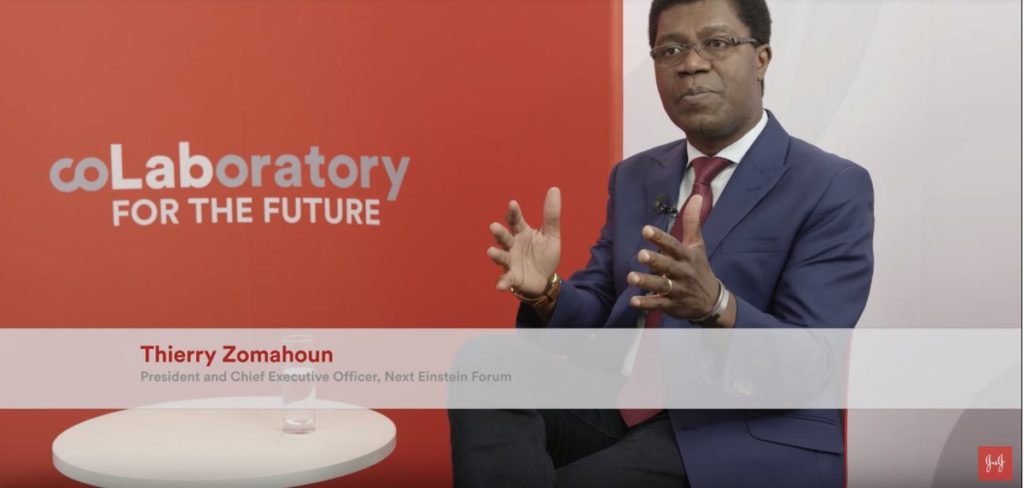
By building a home-grown scientific and technology capacity, added to a pan-African ecosystem of knowledge and innovation, Africa can get past most of the stumbling blocks hindering its development, said experts from the Next Einstein Forum at Davos 2019. The experts took part in ‘Conversations in coLaboratory’, a space for world leaders to engage in dialogue, discussion and debate about innovation, inclusion and positive social impact, and as returning guests to Hub Culture Davos 2019.
Asked what could move Africa forward today Thierry Zomahoun, the President and CEO of the Next Einstein Forum said: ‘It is innovation.’ He went on to explain, ‘Some people think innovation is creativity, it is not; others think innovation is just repackaging, it is not; and others think innovation is just marketing, it is not. Innovation, genuine innovation, is the result, product or outcome of profound technological and scientific thinking.’
The mic returned to Seema Kumar, Vice President of Innovation, Global Health and Policy Communications at Johnson and Johnson, who had in her introductory remarks noted that millennials in Africa outnumber those in all of North America combined. Seema saw in Mr Zoumahoun’s expertise ‘the beginning of something’. She asked: ‘How do we accelerate this innovation, making sure it is a pan-African movement?’
The first to dive in was Elizabeth Rosiello, Founder and CEO of BitPesa, who judged that, ‘Listening, hearing and waiting a little bit’ can help. ‘Just bringing together stakeholders can either ignite or stop innovation from spreading,’ she said.
‘The key element,’ Mr Zoumahoun picked it up, ‘is to have in place the prerequisite for the acceleration. No. 1, the basic infrastructure; no. 2, education—and not any type of education but skills development; and no. 3, the policy and regulatory frameworks, because if the country in which we are implementing a programme is not science-friendly, nothing will happen.’
Mr Zoumahoun’s position is backed up by Academic research. Multiple studies support the view that having an infrastructure that grows local scientists would enable Africa save $4 billion lost in outsourcing STEM-related services to expatriates (data from two decades ago, but has much changed?). In a 2014 World Bank report that assessed progress in global research output, Africa produced less than 1% of global output. One understands why a science-friendly African country would strive to spend more than 1% of its GDP on research and development (R&D).
That was the topic Mrs Nathalie Munyampenda, the Managing Director of Next Einstein Forum weighed up with Edie Lush, the Executive Director of Hub Culture, at Hub Culture Davos 2019. Mrs Munyampenda noted that there are more women in the limelight, but the perception that there are more women in accelerating innovation is deceptive. There has to be sustained culture of increasing the participation of women, she said.
‘The tech field is quite aggressive for women, especially when you plan on having a family. And at some point you might get discouraged and say, let me go and try something else. In Africa, a huge number of women drop out of their science careers. In South Africa, for example, when the minister initiated the Women Research Chairs program, Faculty members told her she would not find those women, in Astrophysics and Cosmology, yet she found them. Another example could be found in Senegal, where they implement a sandwiched research program, noticing that women drop out of the sciences.’
‘What do we have to do more?’ Edie Lush asked her.
‘We have to be bold and courageous.’
